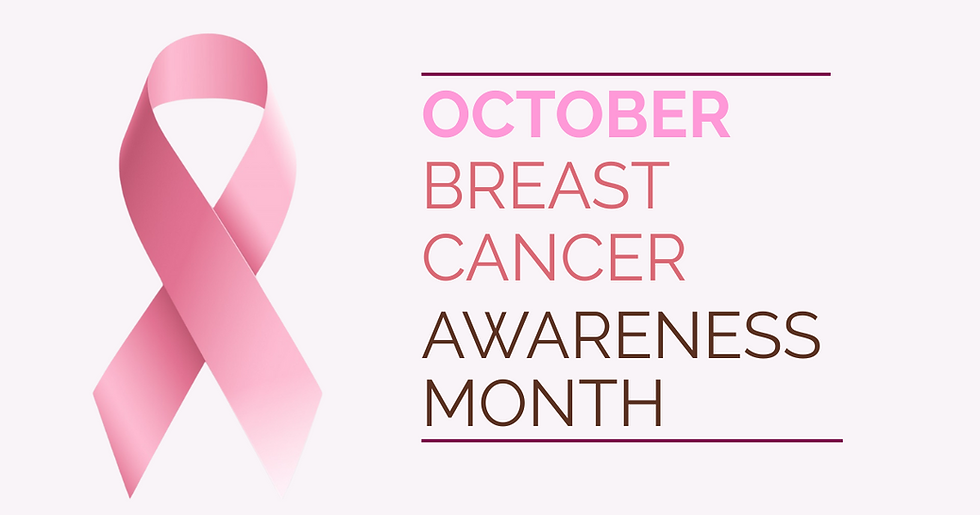October is Breast Cancer Awareness Month: What to Expect
- melissa2097
- Sep 23, 2025
- 3 min read

October is Breast Cancer Awareness Month, a time to focus on the importance of early detection, regular check-ups, and supporting those affected by breast cancer. Breast cancer is the most common cancer among Australian women, but with early diagnosis, treatment outcomes are greatly improved. Knowing what to look out for and when to see your GP is an important step in protecting your health.
What Are the First Signs of Breast Cancer?
Early breast cancer may not cause any pain or obvious symptoms, which is why regular self-checks and screening are vital. Some possible warning signs include:
A new lump in the breast or underarm
Changes in breast shape or size
Dimpling or puckering of the skin
Redness or rash on the breast
Nipple discharge or inversion (turning inwards)
Persistent pain in one area of the breast
If you notice any of these changes, book an appointment with your GP promptly.
How is Breast Cancer Diagnosed?
Diagnosis usually involves several steps:
Clinical examination – Your GP will check for lumps or changes.
Imaging tests – Mammogram, ultrasound, or MRI can provide detailed images.
Biopsy – A small tissue sample is taken and examined under a microscope to confirm diagnosis.
At Alma Street Medical Clinic, our doctors can organise appropriate referrals for breast imaging and specialist care where required.
Breast Screening and Medicare
BreastScreen Australia provides free mammograms every two years for women aged 50 to 74 years. This is part of the national breast cancer screening program.
Women aged 40 to 49 or over 75 can also access free mammograms under Medicare, but will not receive an automatic invitation.
To book your free mammogram, visit BreastScreen Australia on the Department of Health website. Mobile screening services are also available across Australia.
This means from the age of 40 years old, Medicare covers the cost of mammograms – making it easier to take control of your breast health.
Treatment Options for Breast Cancer
Treatment depends on the type and stage of breast cancer. Common options include:
Surgery – To remove the tumour or breast tissue.
Radiotherapy – To target and destroy cancer cells.
Chemotherapy – Medicine to kill cancer cells or slow their growth.
Hormone or targeted therapies – To block hormones or proteins that fuel cancer growth.
Your healthcare team will tailor a treatment plan to suit your individual needs.
Who is More Likely to Develop Breast Cancer?
Anyone can develop breast cancer, including men, but risk factors include:
Being female and over 50 years of age
Family history of breast or ovarian cancer
Inherited gene mutations (such as BRCA1 and BRCA2)
Lifestyle factors such as alcohol consumption, obesity, and lack of physical activity
Even if you do not have risk factors, regular breast screening is important.
Debunking Common Myths About Breast Cancer
Myth: Only women get breast cancer.
Truth: Men can also develop breast cancer, although it is less common.
Myth: Finding a lump always means cancer.
Truth: Most breast lumps are not cancerous, but all should be checked by a doctor.
Myth: Breast cancer only affects older women.
Truth: While risk increases with age, younger women and even men can be diagnosed with breast cancer.
Myth: If you don’t have a family history, you won’t get breast cancer.
Truth: Most people diagnosed with breast cancer have no family history of the disease.
What Should You Do This Breast Cancer Awareness Month?
Perform regular breast self-checks.
Book in for your routine BreastScreen mammogram – free from the age of 40 under Medicare.
Maintain a healthy lifestyle with a balanced diet, exercise, and reduced alcohol intake.
Speak to your GP if you notice any changes or have concerns about your risk.
At Alma Street Medical Clinic, we are here to support our community with preventive care, screenings, and timely referrals. Taking action now can make all the difference in your long-term health.




Comments